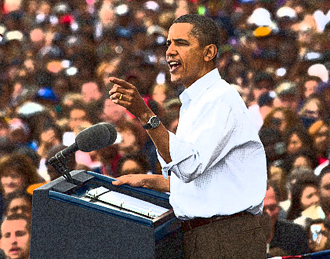Voter polls are useless as predictors of the outcome of presidential elections that are more than a year out, but the most recent ones show that Americans are badly confused. Even as they agree with Obama’s policies, they feel that Rick Perry or Mitt Romney can do a better job of creating jobs.
The confusion has essentially flip-flopped the economic philosophies of the parties. The GOP — the party that, in the name of competitiveness, fights to preserve the right to ship jobs overseas while freely admitting foreign workers for skilled jobs in the U.S. — is now seen as the party more likely to create jobs. Barack Obama — whose Democrats have traditionally promoted full employment ahead of business competitiveness and profitability — is seen as having done more to fatten up corporations than to create jobs.
The confusion flows partly from the assumption that unemployment numbers and job creation are leading indicators of economic health following a financial crisis. This fallacy is apparent when we look at Japan, a nation that has kept unemployment under 5% during most of its past two decades of economic stagnation after its real estate and stock bubble burst in the early 1990s. During the same period Germany — which has enjoyed a more robust economy — has seen its unemployment rate fluctuate between 6% and 10.5%.
The belief that low unemployment is vital to national health is more congenial to Democrats than to right-wingers like Rick Perry or even moderate Republicans like Mitt Romney. Perry’s economic ideal is to let businesses focus on making profits, unburdened by government mandated schemes to promote social welfare or environmental protection. In today’s global economy, that generally means letting big companies send production overseas to lower-wage markets while shrinking domestic operations. And U.S. corporations are now salting away hefty profits and building up impressive cash reserves by trimming their workforces and squeezing more productivity out of employees while eyeing expansion overseas.
As a moderate Republican Mitt Romney has a similar belief system, tempered only by the consciousness that large numbers of idle and impoverished workers can breed social unrest, harming the business climate. Both he and Perry are against spending tax money to promote programs that may temporarily alleviate the impact of high unemployment until real confidence returns. Both he and Perry are against raising taxes on the more prosperous members of society to help ease the pain for the less fortunate. Under this economic philosophy — which generally works fine under non-crisis conditions — the jobs will come when businesses feel confident that they can boost profits by hiring more workers, not before.
And both Perry and Romney would do away with the kinds of financial regulations that will prevent a new generation of ponzi schemes from building toward another massive collapse.
Yet both Perry and Romney are riding high in the polls by touting their ability to turn the economy around quickly and create more jobs.
As the incumbent President Obama is burdened with the reality of an economy that has narrowly avoided plunging into another depression and has made solid progress toward health under life-support systems that are being condemned from the safety of the aftermath. That progress is not fast enough to satisfy those with short memories. Fortunately the great clarifier has over a year in which to educate scared voters that it takes time for a massive ship like the U.S. to reverse course away from the edge of Niagara Falls and start steaming upstream.

